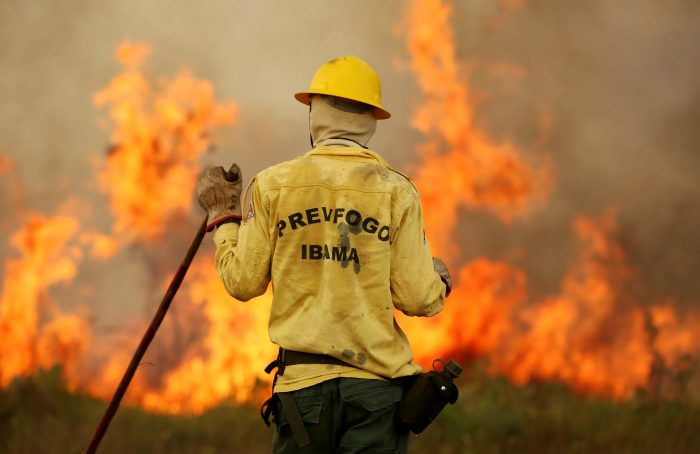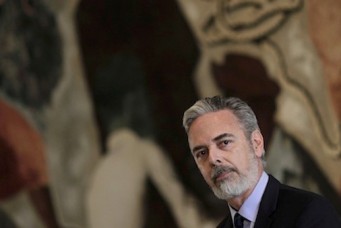Heat is on for Brazil’s Bolsonaro
Bolsonaro has shifted focus from an economic reforms agenda, which the country sorely needs amid recession fears, to a cultural one, which pleases his supporters.

A fire brigade member attempts to control a fire at Tenharim Marmelos Indigenous Land, Amazonas state, Brazil, Sept. 15, 2019. Bruno Kelly/Reuters
The year 2019 has so far been the hottest year on record, and all but the most resolute climate change skeptics agree that we are reaching a turning point. In this context, it is reckless for the leader of the country with the world’s largest rainforest to fire the head of the government’s environmental agency and drastically cut its funding, claiming it tarnished the country’s image when it disclosed recent increases in deforestation.
Reckless, but not unexpected, as Brazilian President Jair Bolsonaro rose to power on a platform largely based on reversing environmental and labor protections. He has cut budgets and slashed protections, crippling IBAMA, Brazil’s environmental protection agency, and scaling back its monitoring and patrolling of forest fires. Without the support of the armed forces, IBAMA was left powerless to act against a concerted effort by farmers and loggers who used a local newspaper to call for a “Day of Fire” on August 10, when several landowners set their own properties ablaze in a show of support for Bolsonaro, claiming they were clearing the land to show their willingness to “get down to work”.
The catastrophic fires continued to burn unchecked, and Brazil, even after worldwide pressure, did little to combat the flames when they were raging at their worst. Bolsonaro first denied the number of fires, then claimed they were fewer than usual for this time of year, and finally, without a scrap of evidence, blamed non-governmental organizations, saying they had set the fires to tarnish his image. The fires have the potential to tip the scales on climate change, and world leaders have reason to worry that Brazil may not be able or willing to protect such a vital resource. Meanwhile, the Brazilian government uses international attention as a way to stoke fears about globalization, claiming that Brazil’s sovereignty is under attack.
In the eleven months since his inauguration, Bolsonaro has been plagued by scandal and disorder. Several members of the government have been shown to have fraudulent publications and educational credentials on their CVs, some claiming nonexistent degrees from Harvard and Yale, and one claiming the degree listed on her curriculum was “biblical” and “God-given”. Olavo de Carvalho, a conspiracy theorist, astrologer, and self-proclaimed philosopher living in the United States, who denies climate change and was called the Rush Limbaugh (an American right-wing radio talk show political commentator) of Brazil by the Washington Post, has a lot of political sway in Bolsonaro’s cabinet.
Not surprisingly then, Brazil’s Foreign Minister Ernesto Araújo reportedly said during a speech at the Washington, D.C.-based Heritage Foundation that climate change is a “Marxist conspiracy” and that “the Amazon is ground zero in the fight against globalism”.
The fear of globalism seems to extend only to countries led by those the Bolsonaro administration considers leftist, such as France’s President Emmanuel Macron and German Chancellor Angela Merkel—both of whom strongly criticized his handling of the Amazon fires. The president has gifted his son Eduardo the post of ambassador to Washington, for which he claims he is prepared because he “flipped hamburgers in cold Maine” as an exchange student. Eduardo, who barely speaks English, has been championed by former White House chief strategist Steve Bannon for joining his Belgium-based Movement, a populist right-wing organization spreading worldwide. Eduardo’s actions and associations are just at the tip of the iceberg of public frustrations.
Few of the objectives initially set by the government have been met, while ending daylight savings time and doing away with much-maligned three-pronged electric plugs are touted as achievements. Of those concrete initiatives which have actually been taken, some are wildly controversial. Promised decrees to ease gun laws were struck down in congress, angering many of Bolsonaro’s supporters, while much of the population breathed a sigh of relief in a country already plagued by violence. The loosening of environmental rules has unleashed the agricultural use of hundreds of substances known to be harmful, a move that can hardly help public health, and will also certainly affect exports. Cuts to university funding for the humanities have been met with massive protests filling the streets, and even angered many who voted for him.
Pro-Bolsonaro rallies have also mobilized the population, although in numbers smaller than expected; this is in stark contradiction to the mass support he garners on social media networks, lending credence to claims that many followers are indeed bots or fakes. What seemed like a shining beacon of hope was the prediction for economic growth, hovering around 2.2 percent for 2019, according to the World Bank’s January numbers. Alas, in June, those numbers were revised to a mere 1.5 percent, far below the 4 percent predicted for emerging markets, and still well below the 2.6 percent predicted globally. Meanwhile, the real currency has more or less maintained its value, and financial markets have done well since Bolsonaro took office, but that optimism may be precocious, and warning signs are flashing. Foreign investors are skittish, aid packages may be drying up, the economic stimulus the reforms promise is far from guaranteed, and the social costs will certainly be high.
Passing pension reforms, considered to be the major achievement of the presidency so far, helped his approval ratings shoot up in the financial markets, although support from those quarters has recently weakened as the president’s seemingly erratic behavior depletes his political capital. The Financial Times says Bolsonaro has shifted focus from an economic reforms agenda, which the country sorely needs amid recession fears, to a cultural one, which pleases his supporters. But even among his Social Liberal Party (PSL), there are those who are wary of his statements on wanting to align church and state.
Bolsonaro seems hell-bent on alienating former allies, canceling an appointment with the French foreign minister at the last minute, citing pressing duties only to publish a live Facebook video of himself getting a haircut at the same time. He launched a particularly mean tirade against Chilean President Michelle Bachelet, saying “if Pinochet’s people had not defeated the Left in 1973—among them your father—Chile would be a Cuba today”. Bachelet and her mother were imprisoned for opposing the 1973 coup, and her father was tortured and died in prison.
As the rainforest burns, so does Brazilians’ rage. Those who continue to support Bolsonaro’s government (nicknamed Bolsominions in a reference to the yellow minions that grovel before their evil boss in the movie Despicable Me), defend his actions against all odds, dismissing any criticism as left-wing extremism. Recent social media posts have even called Pope Francis a communist, stating that he is aligned with leftists to oppose Brazilian sovereignty. Persons or media outlets that dare criticize the president are the targets of smear campaigns and violent threats, but that has not stopped many former supporters from speaking out against him.
Bolsonaro, who was elected with the support of Brazil’s evangelical community, and has appointed several evangelicals to key cabinet posts, often seizes on divisive issues of sexuality and gender to garner support for conservative positions. He has publicly kneeled before Edir Macedo, a controversial pastor who has railed against interracial marriage, and was charged but not indicted for having appropriated billions of dollars in donations often made by some of Brazil’s poorest to his church. Pastor Macedo owns several radio and TV stations, including TV Record, which has over one hundred affiliates all over Brazil and is favored by Bolsonaro and his allies.
The Brazilian government’s affinities with the current U.S. government extend to their evangelical connections. Members of the White House Faith and Opportunity Initiative have actively campaigned for Bolsonaro, with former Republican Congresswoman Michele Bachman featured in a video urging people to vote for the candidate “who supports transferring the Brazilian embassy to Jerusalem.” Capitol Ministries, an evangelical organization close to Trump and Vice President Mike Pence, has already expanded its presence in Latin America since 2017, and some of their leaders have been in Brazil since August, approaching the highest circles of government. Evangelicals’ political power is massive, but, unlike in the United States, is fragmented. However, support for Bolsonaro wavers even among evangelicals. While many laud his morally conservative speeches, there are others among his base that are against his stance on guns and his often violent rhetoric. His promise to move the Brazilian embassy from Tel Aviv to Jerusalem was designed to appease them, and to align with President Donald Trump’s policy, but he has not yet moved in that direction, fearing backlash from Arab League countries, an important consumer market for Brazilian halal chicken and beef exports.
Brazilians are rightly uneasy about military and religious influence in government. Bolsonaro courts both, meeting with military and religious leaders more often than with business leaders or many of his own cabinet ministers. With Brazil becoming a pariah on the international stage, except for pandering to the increasingly authoritarian right-wing governments of the United States, Israel, and Russia, and the now unstable position of institutions within the country, there is a fear of a return to military dictatorship, a particularly bloody form of which ruled Brazil from 1964 to 1985.
On September 8, the president was admitted to hospital for a fourth operation after being stabbed a year ago. His stay in hospital, originally intended to last five days, lasted eight. In the meantime, the presidency was again in the hands of Vice President General Mourão, whom some in the military hail as “the next president”. While he mostly tends to lie low, often positioning himself as the voice of reason in a chaotic government, the retired general has not hesitated to criticize the president in public, and his party (Brazilian Labor Renewal) has been very active in trying to garner support in congress. These squabbles at the highest level of government are not new, but Bolsonaro might do well to remember that his vice president, who conspicuously pays lip service to democracy every chance he gets, was elected alongside him, and that is one head that cannot roll at his will.
Patricia Barbeyron is the director of Portance International Consulting, a strategic and foreign affairs consulting firm.
Read More


